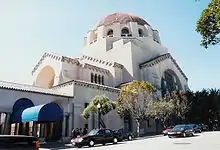Congregation Emanu-El (San Francisco)
Congregation Emanu-El of San Francisco, California is one of the two oldest Jewish congregations in California, and one of the largest Jewish congregations in the United States. A member of the Union for Reform Judaism, Congregation Emanu-El is a significant gathering place for the Bay Area Jewish community.
| Temple Emanu-El | |
|---|---|
 | |
| Religion | |
| Affiliation | Reform Judaism |
| Leadership | Beth and Jonathan Singer (senior rabbis) Ellen Fleischacker (President) |
| Status | Active |
| Location | |
| Location | 2 Lake Street, San Francisco, California, United States |
| Geographic coordinates | 37.7872°N 122.4597°W |
| Architecture | |
| Architect(s) | Arthur Brown Jr. |
| Style | Byzantine Revival |
| Completed | 1926 |
| Specifications | |
| Dome(s) | 1 |
| Dome height (outer) | 150 feet |
| Website | |
| http://www.emanuelsf.org | |
History
During the Gold Rush in 1849, a small group of Jews held the first High Holy Days services in a tent in San Francisco; it was the first Jewish service on the West Coast of the United States.[1] This group of traders and merchants founded Congregation Emanu-El sometime in 1850, and its charter was issued in April, 1851. The 16 signatories were mostly German Jews from Bavaria.
In 1860, Reform rabbi Elkan Cohn joined the Emanu-El congregation; in 1877, he led the congregation as the first in the West to join the Reform Movement.[1] As the Reform Movement in Judaism spread in the United States during the early twentieth century, the synagogue became affiliated with this framework.
In 1884 Julie Rosewald became America's first female cantor when she began serving in Emanu-El, although she was not ordained.[2][3] She served as a cantor there until 1893.[2][3]
Among its major programs today, the synagogue includes worship, youth and adult education programs, and also a major emphasis on social justice.[4]

Clergy


- Rabbi Julius Eckman (1854–1855)
- Rabbi Elkan Cohn (1860–1889)[1]
- Rabbi Jacob Voorsanger (1889–1908)
- Rabbi Martin A. Meyer (1910–1923)
- Rabbi Louis Newman (1924–1930)
- Rabbi Irving Reichert (1930–1948)
- Rabbi Alvin Fine (1948–1964)
- Rabbi Meyer Heller (1950–1963)
- Rabbi Irving Hausman (1964–1967)
- Rabbi Joseph Asher (1967–1986)[5]
- Rabbi Robert Kirschner (1981–1992)
- Rabbi Mark Schiftan (1987–1994)
- Cantor Roslyn Barak (1987–2015, Senior Cantor Emerita 2015-present)
- Rabbi Peretz Wolf-Prusan (1990–2010)
- Rabbi Stephen Pearce, D.D. Ph.D. (1992–2013, Senior Rabbi Emeritus, 2013–present)
- Rabbi Helen Cohn (1993–2005)
- Rabbi Lawrence Kushner (Scholar in Residence since 2002)
- Rabbi Sydney Mintz (1997–present)
- Cantor Marsha Attie (1998–present)
- Rabbi Ryan Bauer (2007–present)
- Rabbi Jonathan Jaffe (2007–2014)
- Rabbi Carla Fenves (2011–2020)
- Rabbi Beth Singer (2013–present)
- Rabbi Jonathan Singer (2013–present)
- Rabbi Jason Rodich (2015–present)
- Cantor Arik Luck (2015-present)
- Rabbi Sarah Joselow Parris (2019–present)
Notable members
- Larry Baer
- Jim Bennett, father of the 13rd Prime Minister of Israel Naftali Bennett
- Joseph Brandenstein
- Stephen Breyer
- Lazarus Dinkelspiel
- Dianne Feinstein[1]
- Donald Fisher
- Doris F. Fisher
- Aaron Fleishhacker
- Richard Goldman
- Rhoda Haas Goldman
- Evelyn Danzig Haas
- Peter E. Haas
- Walter A. Haas Jr.
- Warren Hellman
- Florence Prag Kahn
- Simon Koshland
- Philip N. Lilienthal
- Bob Lurie
- Isaac Magnin
- Raphael Peixotto
- Julie Rosewald
- Nell Sinton
- Douglas W. Shorenstein
- Theodore Solomons
- David Stern
- Levi Strauss[1]
References

- "Emanu-El's pedigree: a towering presence". J. weekly. 1999-10-08. Retrieved 2023-02-03.
- "Julie Rosewald: America's first woman cantor". jwa.org.
- "The Forgotten Woman Cantor: Julie Rosewald Now Getting Her Due - The Jewish Week". The Jewish Week.
- "Tikkun Tikvah - Working to Reform California's Criminal Justice System - Congregation Emanu-El". Congregation Emanu-El. Retrieved 2016-10-18.
- Kirschner, Robert (1991). "A Singular Elegance". In Rischin, Moses; Asher, Raphael (eds.). The Jewish legacy and the German conscience. Berkeley, CA: The Judah L. Magnes Museum. p. 47.
Further reading
- Rosenbaum, Fred, Visions of Reform : Congregation Emanu-El and the Jews of San Francisco 1849–1999, Judah L. Magnes Museum, 2000, ISBN 0-943376-69-6 ISBN 978-0-943376-69-1
- Rosenbaum, Fred, Architects of reform: congregational and community leadership Emanu-El of San Francisco, 1849–1980, Western Jewish History Center, Judah L. Magnes Memorial Museum, 1980
- Voorsanger, Jacob, The Chronicles of Emanu-El, Spaulding Press, 1900.